- Home
- Jane Smiley
Perestroika in Paris Page 3
Perestroika in Paris Read online
Page 3
And so they did, Frida suspiciously, Paras hungrily. Raoul flew ahead of them, swaying lightly in the breeze, maybe half a meter above Frida’s head and two meters in front of her. Frida carried the purse. Paras seemed to accept that the purse had become the dog’s responsibility. Raoul brought them to the road, to a low fence, less than a meter high. The approach was terrible, Paras thought. She was just attempting to gauge the footing when Frida pushed it open with her nose and went through. Paras followed her.
The path ran downward beside a high curving wall and was, in one place, quite narrow. But Paras caught some bites of grass, and took a drink from a small pond. The grass was short and not very tasty, so she tried a few leaves here and there. When the path widened, however, they came upon a rolling green prospect. Paras snorted. Raoul lifted his wings, stuck out his toes, and landed on a tree branch. He said, “I think I may say that this is the pride of my domaine. The humans have named it the ‘Palais de Chaillot.’ ”
“You own this?” Frida set down the purse.
“What is ownership these days?” said Raoul. “I oversee it. That is my only claim.” Then he said, “You said you were hungry?” He lifted his wing and gestured in a large semicircle, taking in the entire park. “The insect kingdom is yours for the asking, and, of course, small children and older adult humans are always dropping things as they wander in their aimless way around the greenery and the paths.”
Paras began grazing, but she was still careful to step around benches and bushes. Frida did not want to look hungry, but she was, so she checked under a few of the same benches and bushes without taking her eye off the purse, and she even got up on her hind legs and peered into a trash bag. Her reward was a half-eaten shish kebab wrapped in a pita. A human had taken a bite or two and tossed the rest, still in its paper, into the garbage bin, which was full, so the sandwich was right on top. She found it a nice change from cheese. Raoul hopped along the paths, snapping up this and that. When he got near the purse, he touched it with his beak. Frida was certain he would not be able to lift it, but even so, she said, “That’s the horse’s purse.”
Raoul pecked at it.
Frida walked over, picked it up, and carried it a few steps away, where she set it down and sat over it.
Raoul said, “Is this a precious object?”
“In a way.”
They stared at each other. Finally, Raoul said, “Ask yourself, do not Aves live free and clear of such things as possessions? What is a nest but a temporary assemblage of bits and pieces—of trash, if you will—collected and molded into a comfortable, but always ephemeral, dwelling? Most Aves live to see the world, not to claim it. Even territorial Aves, such as myself, make their claims as a gesture, merely to start an argument with other territorial birds. We live to fly. We live to argue. What is in the purse?”
“Money,” said Frida. “Lots of money.”
“Aves use money all the time.”
“They do?” said Frida. In all her life in Paris, she had never seen a bird pay for anything.
“I have a ten-euro note right in my nest. You get it nice and wet and press it for a bit, and it makes a superior bed. Sturdy, soft, smooth.”
“You found a ten-euro note lying around?”
“Yes. On a desk. Through an open window. In and out in a matter of moments.”
Raoul went back to pecking the border of the path, and soon enough came up with a caterpillar. He pecked it, tossed it, opened his beak, gobbled it down. Paras continued to graze. She was now just a dim figure in the darkness, but Frida could hear her. Time, she thought, to take the purse and slink back to the Place du Trocadéro; this raven, this Raoul, could show Paras the way to the racecourse, the best place for her. But she had to think about it, so she lay down, and then she stretched out, and then she rolled, and then she rolled back the other direction, and between one thing and another, she was a little surprised to hear a loud clipping and clopping from the other end of the park. Raoul said, “Where is she going?”
Frida said, “You can fly—you tell me.” And Raoul soared into the dark.
Paras was, indeed, a curious filly. The fact was that the grass in the park that swept down the hill to the river in front of the Palais de Chaillot was good enough to satisfy her appetite temporarily, but not delicious. And so she wandered along, taking a bite here and there, trying a few leaves, wondering, as she had so often in the past, what was ahead, where the bright lights were. She quickened her step and then crossed a narrow street.
All her life, Paras had heard the humans talking about her—she’s nervous, she’s sensitive, she’s spooky, be careful, she can get out from under you in a second. The way Paras saw it was that she was interested in lots of things, and there were lots of things that she had never seen before. Unbeknownst to the humans, she was farsighted. There had been many times, out on the racecourse, on the training track, and even in the barn, where she had looked up and said, “What’s that?” or, “Do you see that?” and the horse beside her had said, “What are you talking about?” If there was something to look at, a smart and curious filly was obliged to look at it, and she did. Delphine had learned over the months just to let her look. Quite often, when they were out training, Delphine let her stand there on her own, her reins loose, while she stared at the trees or the other horses or the wind blowing over and through the jumps, and then, when Paras figured out what she was looking at, she went along, doing her job. Now, at the end of the park, which was dim and green, she saw something she had never seen before—a group of small horses in proud, alert postures, standing absolutely still, not even grazing or nosing each other. She stepped carefully toward them.
She would have thought they’d snort or turn their heads, or at least flick their ears, but they did nothing of the sort. They only stood there, their necks arched and their nostrils flared. She got closer, step by step, then stood very quietly, and finally stretched out her neck and sniffed one of them. He was cold and hard, and smelled something like a truck. She snorted and backed up.
Frida, glad she had found Paras, said, “Haven’t you ever seen a carousel before?” She leapt up onto the platform that the horses were standing on and sat down. Raoul swooped over Paras’s head and landed on the haunch of the nearest horse, where he fluffed his wings and then assumed a knowing posture. He said, “Perhaps you ladies do not understand the demands of offspring. They require entertainment, none more so than humans, who seem to take years before they start foraging for their own sustenance, and so what is there for them to do? We Aves often discuss this mystery, the idleness that is endemic among humans, and yet they thrive—”
Paras touched the curving mane of the horse again with her nose and said, “A useless beast.” She was disappointed and turned away.
It was now that the curious filly made her choice, and she made it just for that reason—she was curious. She could have turned left, gone back up the grassy hill. She could have stared at the fountains and the brilliant façades of the golden buildings that stretched grandly to either side. But, instead, she followed the scent of the river, and the sound of her own hooves ringing on the pavement. She crossed the bridge at a trot, tossing her head. She said to herself, “Why not? Let’s see what’s over there.”
* * *
DELPHINE AND RANIA had looked for Paras for eighteen long hours. The night she escaped, taking the purse and Rania’s phone, Rania had had to wait, impatiently, for Delphine to return with the trailer. It was almost midnight, but they had unhitched the trailer, driven around Auteuil, peering into the dark as best they could, then gone back to Maisons-Laffitte. In the morning, they got up, fed the other horses, came back into town, drove around the Bois de Boulogne and Longchamp, everywhere they could think of. A very long day, and now Delphine was alone and extremely tired, but unable to give up. She and Rania had passed Paras twice the night before without seeing her—once when Paras was curl
ed up, sleeping in the Place du Trocadéro, and once when she was following Frida down the garden path. The reason they didn’t see her then was that they were not looking for her—they assumed that she was lost in the Bois de Boulogne, which was a very large park, many kilometers around and many kilometers across. The reason Delphine didn’t see her this time, when Paras was standing just beneath the Tour Eiffel, was that she was looking in the other direction, toward the river. Delphine did get a funny feeling, though, and so, just beyond the Avenue de la Bourdonnais, at the Avenue Bosquet, she decided to turn around. She drove south again. But by the time she was passing the Tour, Paras had noticed the pond that was outside of the tower lights and had walked into the darkness. Delphine got to the Pont de Bir-Hakeim, decided not to think crazy thoughts, and went across the bridge, back to the Bois for one last look.
THREE
The pond beside the great four-legged brilliant thing that Paras could not see to the top of was inside a low fence, but this time, the footing of the approach was fine. Paras backed off five strides or so and popped over it. The grass inside the fence was rich and deep, and the water in the pond was good enough. In Paras’s experience, everywhere you went, the taste of water was different. Here it was rich and dirty, but with a sweetness, too. She was thirsty, and drank her fill. Frida soon appeared, and she, too, jumped the fence. Her form was good, Paras thought, in spite of the weight of the purse between her jaws—knees tucked, a little kick of the hind legs to clear the top metal bits. Frida took a drink. And then the screaming began. Paras was startled, and snorted and reared, but Raoul, who floated in, wings stretched, and landed on a low branch overhanging the pond, cawed dismissively and said, “Mallards. Common. Anas platyrhynchos.”
Sure enough, the screecher was a shining green duck, plump and well preened. He waddled toward them, stopped, and screamed again. Behind him was a duller bird. Raoul said, “She would be the wife.” He sniffed. The wife quacked several times: “I don’t think you should do that, honey. I think we should mind our own business. Lower your voice! Look at her, she eats grass! What’s the harm?”
Paras walked along the edge of the pond. It was entirely fenced in, but the fence was low, and there was plenty of vegetation. She could see that dawn was approaching, and this seemed a favorable place to take another rest. Frida yawned. Paras yawned. Paras went to a spot in the lee of a wall, lay down, and curled up. Frida hid the purse, and then lay down beside her. As she drifted off, Paras realized that her decision had been made.
The mallards were named Sid and Nancy. Sid allowed Paras and Frida to sleep—he had other matters to attend to, particularly preening, which was time-consuming, but if you wanted to swim, it had to be done. When the horse and the dog woke up, though, he felt that he had to make explicit his view that they had invaded his territory: he screamed himself hoarse, in spite of Nancy’s incessant advice to calm down. Finally, he flew away. Nancy sighed, shook her head, and flew after him. Late in the night, they came back. The horse and the dog were still there, and so was the raven. Ravens, in Sid’s experience, lived off the efforts of others and considered themselves very smart. He pondered screaming at the raven, too, but he suspected that the raven would ignore him, or perhaps get some other ravens and mob him. That would not be a pleasant experience. Sid decided to keep his trap shut. Nancy, he could see, was relieved.
* * *
IT DIDN’T TAKE Paras long to adjust to her new surroundings—daylight hours inside the fence, in the shadow of the bushes, nighttime roaming the Champ de Mars. Adjustment to new events was something she was used to, and, anyway, the grass in the Champ de Mars was flavorful, quite comparable to the grass at the stud farm where she had spent her youth, thick and juicy, and there were other small plants and tufts of delicious weeds here and there, enough to hold her interest. In some ways, the Champ de Mars reminded Paras of places she had always known—it was green and enormous, like a big pasture, though flatter. Houses encircled it, cars ran through it, but not across the grass. There were trees and ponds and places to lie down for a good roll. Beneath the giant tower, she could smell the river and see the hill rising on the far side. At the other end, there was yet another grand building, but not many people went in and out of it, at least at night, when Paras was out and about.
Frida was not so sure about the Champ de Mars—it was too exposed for her taste, and there were so many humans around that Frida worried about the purse. Jacques had brought her here only once, in an attempt to play his music for humans standing in line at the base of the giant tower, but he and Frida had been sent off by an abrasive fellow in a uniform. Paras evidently liked it, though, and so Frida decided to stay. After a few days, she found a soft spot among the bushes beside the pond and dug a deep hole. She was good at digging—she had sharp toenails and strong paws. The effort was satisfying in its way—once the hole was big enough, she could not only hide the purse in it, she could curl up on top of the purse and take a rest. She enjoyed the hole. She felt good in the hole, maybe the best she’d felt since Jacques had been carried off.
The real question for Frida was what to eat. Though she was a hunting dog, she was not much accustomed to game, given all the scraps of human food she had eaten over the years. She caught a vole, but the flavor was pretty rank. She did not feel comfortable stalking and killing Sid and Nancy as she came to know them. There were other birds. Sid often said to her when he saw her staring at one, “Go ahead! Kill it! I know you want to!” But in fact she didn’t know how to, except by chance. She had yet to see a rabbit. Squirrels weren’t worth the trouble. And there was plenty of money. The scent of a nearby meat market was very strong—depending on the breeze, it wafted over the entire grassy park, saying to Frida, “Beef, lamb, pork, chicken.” It drew her, and so, one morning, perhaps the third morning after she and Paras settled next to the pond, she trotted toward it, right down the allée, under the trees, and then up the first street and the second, as if she were following her master home from her walk. When she found it, it reminded her of Jacques, who had quite often gone into such places and come out with some bones for her, or a piece of chicken. She lingered outside the door, but she knew that she could not appear hungry or desperate, or the shop owner would call the gendarmerie. She went back to the pond, stopping at a trash bin to snare a rind of cheese and half of an egg sandwich.
She returned the next day and the next, but remained undecided about her strategy. She was sitting quietly beside the vegetable market, enjoying the scents from the meat market. It was a sunny day for so late in the year, and the doors of both shops were open. Ladies with bags and baskets had been going into and out of the vegetable market, but now the traffic had slowed. The proprietor stepped into the street, his arms crossed over his chest, and regarded her. Frida straightened up, as if she’d been ordered to “stay” by her owner, and tried not to look at this man. He was tall, with a big nose and big feet. He wore a long white apron. He stepped closer, and his eyebrows lowered, as if he were wondering about her. He looked one way up the street, and then the other, and the street was empty. Just for the moment, there was no one to pretend that she belonged to. He came toward her, leaned down, stretching his hand out as if to grab her.
Frida knew that there were some dogs who would have snarled and maybe bitten the man’s hand, but she was not that sort of dog. What she did was offer him her paw and look him in the eye, then look away. The man laughed, shook her paw, and said, “Bonjour, mademoiselle.” After a moment, Frida politely removed her paw. The man stood up, smiling, and went back into the shop. He returned and tossed her a small roll, which, of course, she caught neatly and gobbled down. Then she rose and trotted away, very dignified, back to the Champ de Mars, where Paras was curled up for her afternoon nap and the mallards were floating in the water the way they always did, Sid in the lead and Nancy just behind him. Raoul was nowhere to be seen.
Frida took a drink from the pond, which stank terribly of duc
k.
It was the sight of a plastic bag filling up with a puff of air and lifting itself out of a garbage bin that reminded Frida of what Jacques had taught her about money. When it drifted to the ground and skidded off, she ran after it, secured it with her paw, and took it between her teeth. Here she had spent the entire summer scuttling about, pretending to be owned by someone, and losing lots of weight, when what she really had to do was perform a few tricks. Humans were pushovers for tricks. They always laughed and gave you a treat. How many times on the street with Jacques had she rolled over, or covered her eye with her paw, or put the toy in the guitar case, or balanced the piece of bread on her nose and then tossed it and caught it? Jacques, of course, did tricks, too—playing songs and sometimes singing. Tricks got you money, and then you took the money and exchanged it for what you wanted. The thing she must do was put some of the money into the plastic bag, then carry the bag to the meat market.
It could not be said that the bag was easy to manage in the breeze rising off the river, but she did uncover the purse, nose it open, and take a bill in her mouth. She then scratched at the bag with her paws, and, when the edges came apart, pushed the bill between them. She picked the whole unwieldy object up in her mouth, then kicked the loose dirt back over the purse. She looked around. The only humans she could see were running ones, rushing away through the trees. Running humans never looked at a thing, Frida thought. Perhaps they could not do two things at once, which was why she had never seen even the fastest ones catch a pigeon.

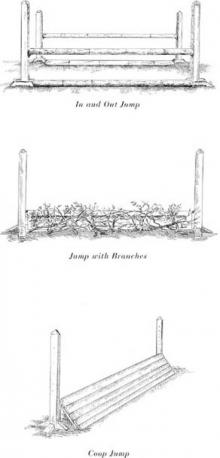 The Georges and the Jewels
The Georges and the Jewels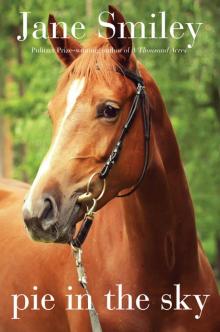 Pie in the Sky: Book Four of the Horses of Oak Valley Ranch
Pie in the Sky: Book Four of the Horses of Oak Valley Ranch Duplicate Keys
Duplicate Keys Charles Dickens
Charles Dickens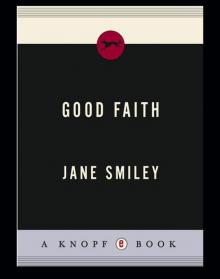 Good Faith
Good Faith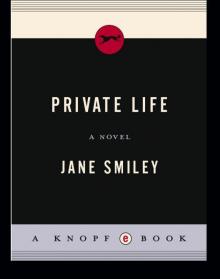 Private Life
Private Life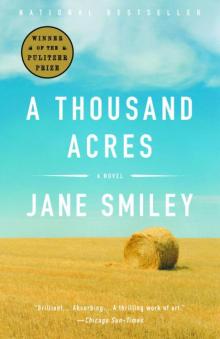 A Thousand Acres: A Novel
A Thousand Acres: A Novel The Greenlanders
The Greenlanders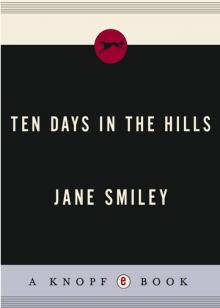 Ten Days in the Hills
Ten Days in the Hills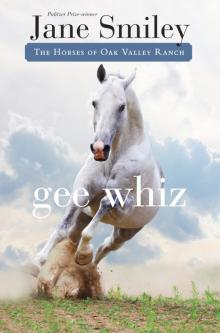 Gee Whiz: Book Five of the Horses of Oak Valley Ranch
Gee Whiz: Book Five of the Horses of Oak Valley Ranch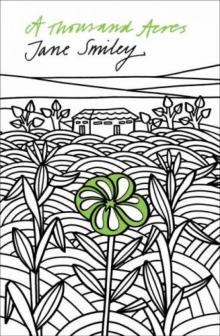 A Thousand Acres
A Thousand Acres The All-True Travels and Adventures of Lidie Newton
The All-True Travels and Adventures of Lidie Newton Ordinary Love and Good Will
Ordinary Love and Good Will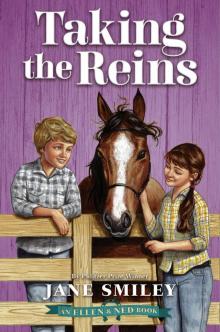 Taking the Reins (An Ellen & Ned Book)
Taking the Reins (An Ellen & Ned Book) The Man Who Invented the Computer
The Man Who Invented the Computer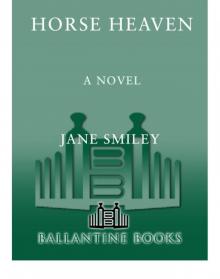 Horse Heaven
Horse Heaven The Age of Grief
The Age of Grief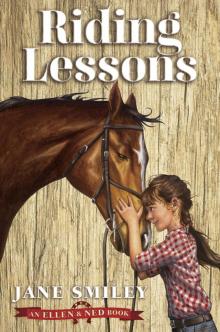 Riding Lessons
Riding Lessons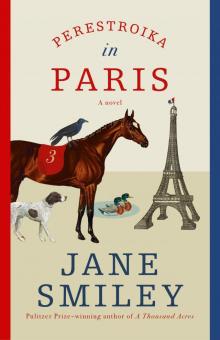 Perestroika in Paris
Perestroika in Paris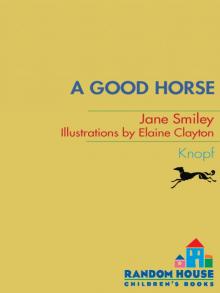 A Good Horse: Book Two of the Horses of Oak Valley Ranch
A Good Horse: Book Two of the Horses of Oak Valley Ranch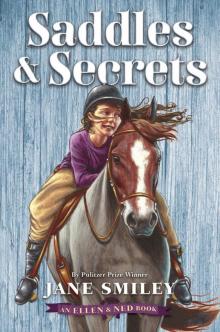 Saddles & Secrets (An Ellen & Ned Book)
Saddles & Secrets (An Ellen & Ned Book)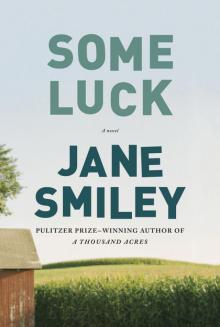 Some Luck: A Novel
Some Luck: A Novel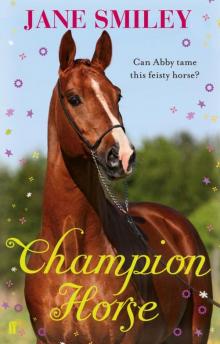 Champion Horse
Champion Horse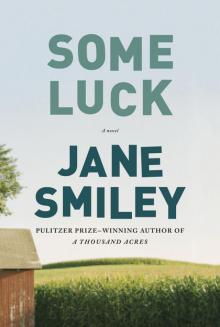 Some Luck
Some Luck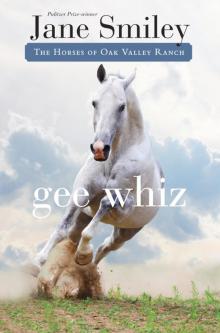 Gee Whiz
Gee Whiz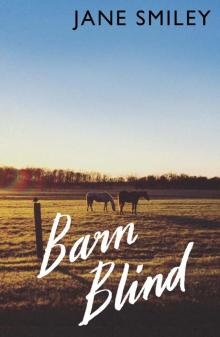 Barn Blind
Barn Blind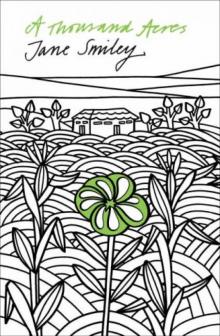 A Thousand Acres (1992 Pulitzer Prize)
A Thousand Acres (1992 Pulitzer Prize)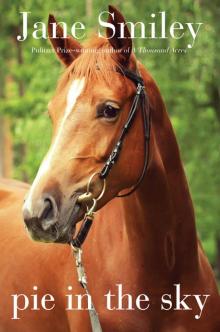 Pie in the Sky
Pie in the Sky True Blue
True Blue A Thousand Acres_A Novel
A Thousand Acres_A Novel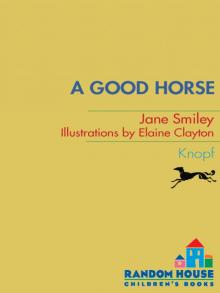 A Good Horse
A Good Horse